Why Am I Always Being Researched? Seven Inequities Framework
 Chicago Beyond’s Why Am I Always Being Researched? Seven Inequities framework outlines seven ways that power dynamics can bias research agendas, generate misrepresentative results, perpetuate structural discrimination, and contribute to community disinvestment
Chicago Beyond’s Why Am I Always Being Researched? Seven Inequities framework outlines seven ways that power dynamics can bias research agendas, generate misrepresentative results, perpetuate structural discrimination, and contribute to community disinvestment
The Seven Inequities framework was developed by Chicago Beyond, an impact investor that backs the fight against pervasive inequities in Chicago communities. Since its founding in 2016, the organization has invested more than $30 million towards the aspiration that all youth have the opportunity to achieve their fullest human potential—in Chicago and beyond.
The Seven Inequities framework outlines seven ways in which power dynamics can bias research agendas and perpetuate the very inequities researchers may be trying to understand or “solve.” The model describes how inequitable approaches to research can generate misrepresentative results, perpetuate structural discrimination, and contribute to community disinvestment. In response to these inequities, Chicago Beyond proposes a set of complementary opportunities and strategies—driven by authentic community engagement, involvement, and collaboration—that community organizations, funders, and researchers can use to design research studies and evaluations in ways that produce more authentic truths that will better serve communities.
“If evidence matters, we must care how it gets made…. We at Chicago Beyond see this publication as a start—it is by no means the answer. We wrestle regularly with operating in this world while envisioning an equitable one. We ask you to join us in questioning, wrestling with bias, and pushing against ‘how it has always been done.’ We need to collectively move from insufficient understanding to more authentic truth. The stakes are too high for us to do otherwise.”
Why Am I Always Being Researched?: A Guidebook for Community Organizations, Researchers, and Funders to Help Us Get from Insufficient Understanding to More Authentic Truth by Chicago Beyond
The purpose of the Seven Inequities framework is to help “level the playing field and reckon with unintended bias when it comes to the research,” according to Chicago Beyond. “It is about shifting the way community organizations, researchers, and funders ask for, produce, and use knowledge. It is about restoring communities as experts. It calls on us all to stop, recognize, and question bias.” The framework can be applied to all forms of research and evaluation, though it’s fundamental values, principles, and practices share many commonalities with participatory approaches to action research and evaluation.
Chicago Beyond’s Seven Inequities framework is described in the publication Why Am I Always Being Researched?: A Guidebook for Community Organizations, Researchers, and Funders to Help Us Get from Insufficient Understanding to More Authentic Truth. Released in 2019, the detailed guide is the product of several years of organizational self-reflection by Chicago Beyond, and it distills the insights, lessons, and wisdom of dozens of leaders and community organizations.
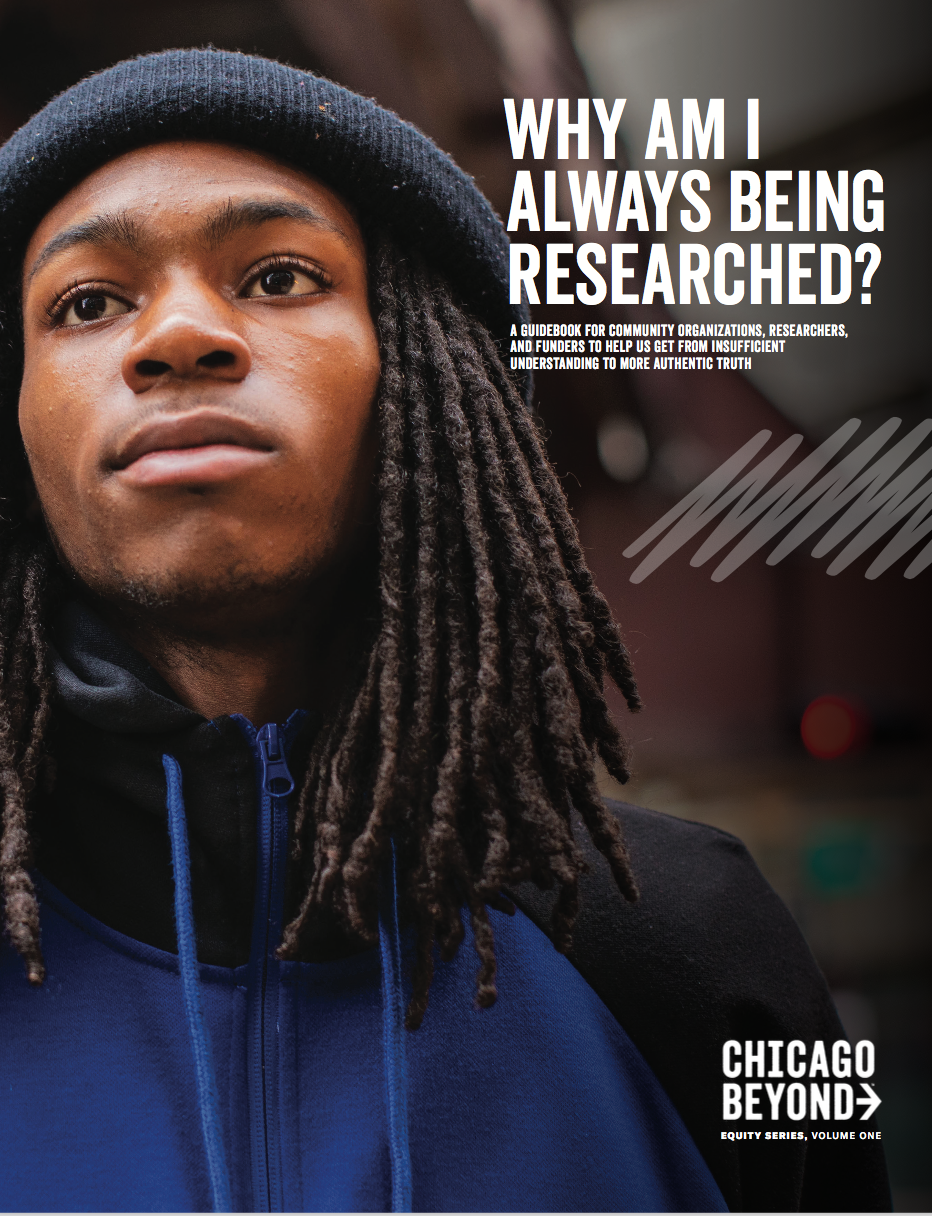
In the introduction to Why Am I Always Being Researched?, Chicago Beyond describes the origin and purpose of both the guide:
“As an impact investor that backs the fight for youth equity, Chicago Beyond has partnered with and invested in community organizations working towards providing more equitable access and opportunity to young people across Chicago. In many cases, we have also invested in sizable research projects to help our community partners grow the impact of their work. Our hope is that the research will generate learnings to impact more youth in our city and nationwide, and arm our partners with “evidence” they need to go after more funding for what is working.
Through the course of our investing, another sort of evidence emerged: evidence that the power dynamic between community organizations, researchers, and funders blocks information that could drive better decision-making and fuel more investment in communities most in need. This power dynamic creates an uneven eld on which research is designed and allows unintended bias to seep into how knowledge is generated….
Right or wrong, research can drive decisions. If we do not address the power dynamic in the creation of research, at best, we are driving decision-making from partial truths. At worst, we are generating inaccurate information that ultimately does more harm than good in our communities. This is why we must care about how research is created.”
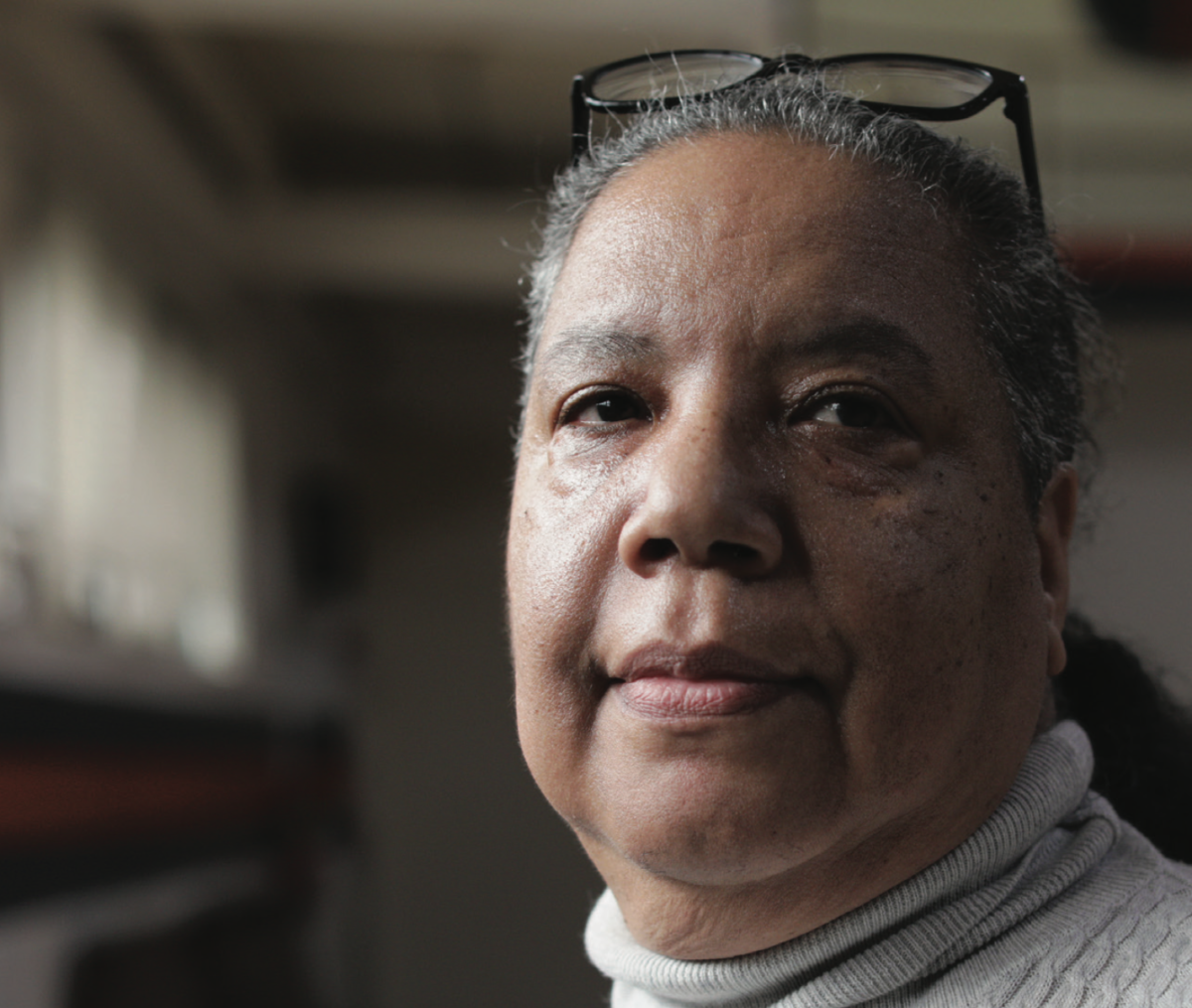
According to Chicago Beyond, Why Am I Always Being Researched? is intended to:
- Fuel community organizations to not only participate in research on their own terms, but to lead it.
- Support researchers in recognizing their immense influence and unintended bias in shaping the questions asked and the inputs used to answer them.
- Inspire funders to ask hard questions about their agendas, unlock more meaningful knowledge, and therefore achieve greater impact.
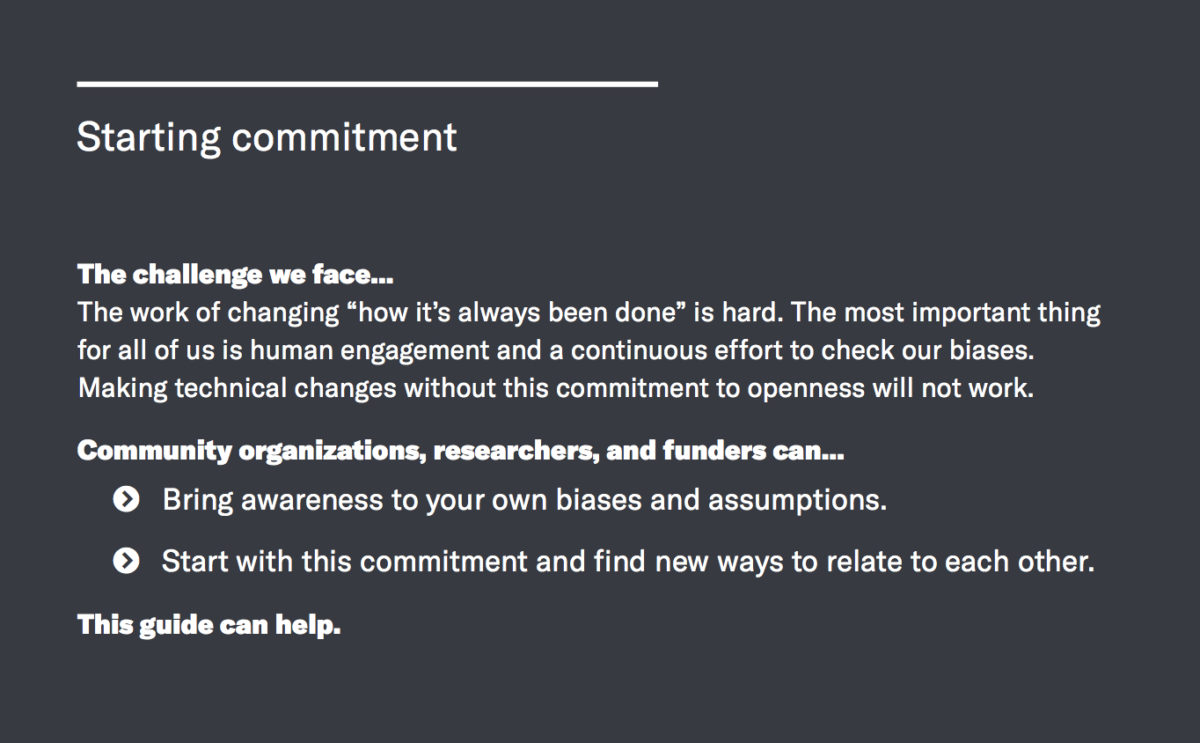
The Seven Inequities Framework
The full title of the Seven Inequities framework is Seven Inequities Held in Place by Power, Seven Opportunities for Change. As the name suggests, the framework explicitly addresses how power, wealth, and privilege influence the priorities, methods, and outcomes of a research or evaluation program, and how research conventions, professional orthodoxies, implicit bias, cultural blindspots, and other factors function in ways that distort the objectives, findings, and interpretations of research.
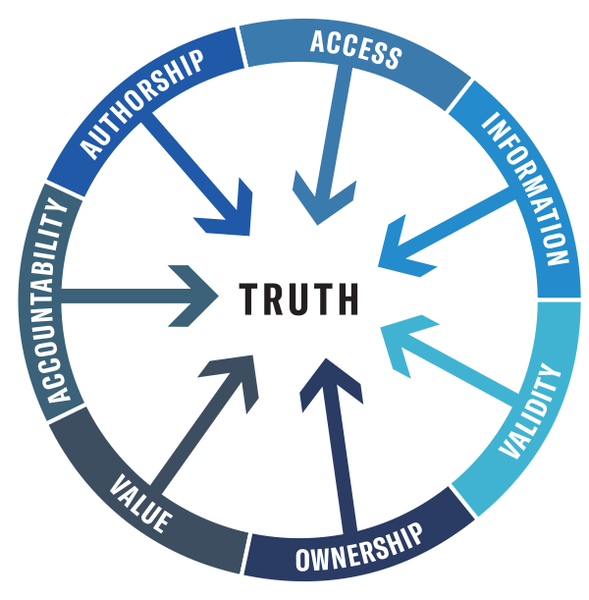
Chicago Beyond describes some of the experiences that ultimately led to the development of the framework:
“In the course of our work, we have seen community organizations with deep expertise contribute to how research gets produced, researchers with a desire to work with community organizations to define outcomes, and funders committed to advocating for a central role at the research table for community organizations.
On the flip side, we have heard program staff struggle with what the proposed research design means for their relationships in their communities and with their families. We have heard social workers wonder why validating their work to those with power starts with inputs that have structural racism built in to them. We have seen funders, researchers, and community organizations jump to action when research protocols or timelines are at risk, but silent when research does not produce a high-quality outcome for the community. We have heard community organizations wonder why researchers who are disconnected from their communities have the privilege of telling them what works and what does not.”
Brief introductions to each of the seven inequities are reprinted below, in full, with permission from Chicago Beyond. For those who want to dig deeper, Why Am I Always Being Researched? provides detailed guidance, along with numerous examples of effective practice, for community organizations, researchers, and funders who want to build more equitable research and evaluation programs.
1. Access
Central Question
Could we be missing out on community wisdom because conversations about research are happening without community meaningfully present at the table?
The Challenge
Access to creating knowledge about communities and the programs that serve them is controlled by people outside those communities, who also often control the questions asked.
Conversations about research often happen without community organizations or community at the table, or on an “invitation only” basis on others’ terms.
The Implication
When a voice is missing from the table, the answers we get are insufficient. We may perpetuate bias, and fail to find out.
The Opportunity
Community organizations can…
- Recognize that the power dynamic makes it tempting to compromise what matters for the chance to produce research evidence.
- Where possible, speak up to participate—or not participate— in research on your own terms, and shape research to help your community.
Researchers can…
- Design research to serve community purpose.
- Not participate in research that perpetuates the researcher as “brains” and community as “brawn” stereotype.
- Insist that conversations about community happen with community.
Funders can…
- Fund research that community organizations want, need, and are able to lead. Fund research that informs action on root causes.
- Not fund research where the questions asked and the approach hold power dynamics in place.
- Insist that conversations about community happen with community.
2. Information
Central Question
Can we effectively partner to get to the full truth if information about research options, methods, inputs, costs, benefits, and risks are not shared?
The Challenge
Information about research options, methods, inputs, costs, benefits, and risks often reside with researchers and funders, but less often with community. Often, the community does not have enough information to contribute their wisdom to which questions are asked and why, what outcomes are the focus, and what data sources are used—or to give informed consent to participate in the first place.
The Implication
When one party does not have full information, it is difficult to partner effectively or to get to the full truth.
The Opportunity
Community organizations can…
- Get informed. Know your options, know your rights, know the risks.
- Seek and use information to ask questions about methods and inputs.
Researchers can…
- Share information, recognizing that without it, the community organization cannot actually consent to the research.
- Have reciprocal exchange about methods and inputs.
Funders can…
- Ensure accountability for the community organization to understand the options and the risks.
3. Validity
Central Question
Could we be accepting partial truths as the full picture, because we are not valuing community organizations and community members as valid experts?
The Challenge
Community organizations and members are often viewed as credible sources when talking about the community, but they are not viewed as voices with authority to sway those with power. The institutions, frameworks, methods and data sources seen as most authoritative and valid are often far from community reality.
The Implication
When outside experts hold the authority to produce and interpret knowledge, we diminish the value of community voice. Without that community wisdom, we accept partial truths as the full picture.
The Opportunity
Community organizations can…
- Value the validity of your own voices at the table, especially on the questions, the inputs to answer the questions, and how participants experience the research.
- Build relationship with the researcher. Check partial truths.
Researchers can…
- Recognize how the research frameworks, process and inputs reinforce power dynamics, and bring your creativity to making change.
- Build relationship with the community organization.
- Check partial truths.
Funders can…
- Be accountable for what questions the research you fund asks, and what processes and inputs it is (and is not) validating.
- Create accountability for authentic engagement between community and researchers. This will check partial truths.
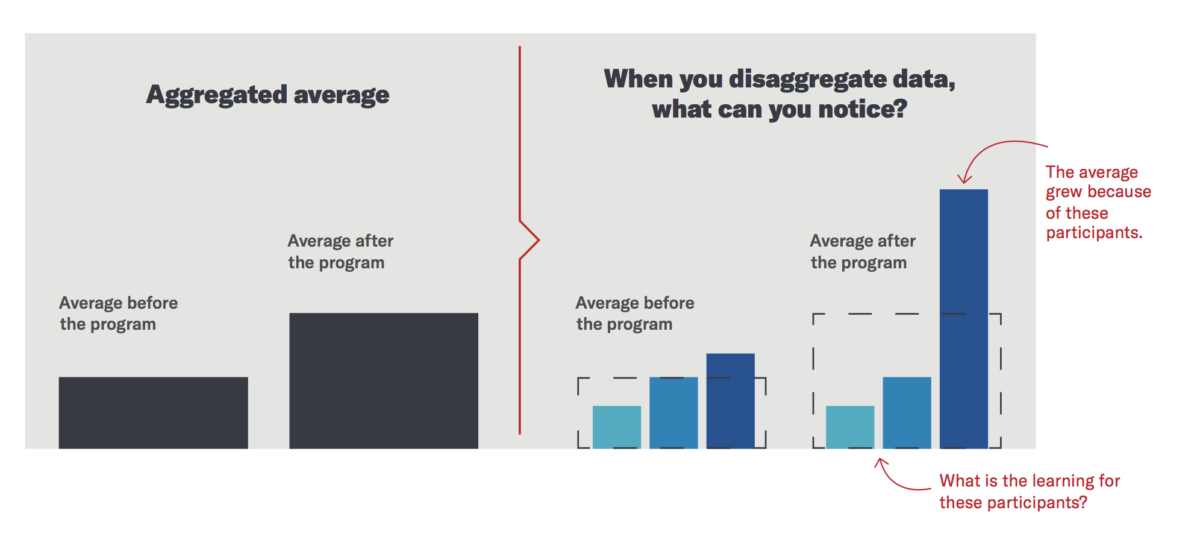
4. Ownership
Central Question
Are we getting incomplete answers by valuing research processes that take from, rather than build up, community ownership?
The Challenge
Community organizations often cede critical decisions about how the study operates, what to measure, how study tools are developed, and what participants experience, because they do not feel they have equal ownership in the research. This is solidified in legal agreements and permissions, which may say that the community organization cannot access the data itself, does not own data produced by the study, or must seek permission to speak about the research.
The Implication
Without shared ownership, the process of research can take from, rather than build up, the community, and the inputs and answers are incomplete.
The Opportunity
Community organizations can…
- Recognize that the power dynamic makes it tempting to cede ownership.
- Build your ownership of your study, which starts with knowing what you want to learn, and why. It is likely that your organization has the most at stake.
Researchers can…
- Invite co-ownership of research, in your processes and legal agreements.
Funders can…
- Set expectations for co-ownership of research, in processes and legal agreements.
5. Value
Central Question
What value is generated, for whom, and at what cost?
The Challenge
Research often fails to teach us what is working or produce value for the community. At the same time, research often comes at a high tangible and intangible cost. Community organizations and communities shoulder financial and relational costs that are not explicit, visible, or compensated.
The Implication
Uneven accounting allows investment to be high while impact is low.
The Opportunity
Community organizations can…
- Get aware of the potential costs—including intangible costs to your participants, organization and community—and advocate for a full accounting.
- Get clear and speak up on how research can produce value for your community.
Researchers can…
- Recognize the full cost of the research—including intangible costs to participants, community organization, and community—and find ways to support it.
- Shape research so producing value for the community is central.
Funders can…
- Account for the full cost of the research—including costs to recruit additional participants, intangible costs borne by participants, staffing at the community organization—and support these costs.
- Insist on clarity: How will the research benefit the community? According to whom?
6. Accountability
Central Question
Are we holding funders and researchers accountable if research designs create harm or do not work?
The Challenge
Often, funders and researchers choose whether or not to take responsibility and make changes when the way research is designed unintentionally creates harm or does not work, while the community organization and community bear the greatest risk. Community organizations have to prove their effectiveness and fidelity, while funders and researchers are exempt from the same scrutiny and vulnerability.
The Implication
Without accountability, trust is limited, and the work cannot be as bold. Worse, communities can be harmed.
The Opportunity
Community organizations can…
- Build trust-based relationships with the other entities. Hold researchers with whom you have built trust accountable.
- Identify and mitigate risks to you and to your stakeholders.
Researchers can…
- Build trust-based relationships with the other entities. Be accountable to understand the context.
- Own your role in missteps.
- Help identify and mitigate risks.
Funders can…
- Build trust-based relationships with the other entities. Be flexible in timelines so trust can develop. Be accountable to understand the context.
- Own your role in missteps.
- Help identify and mitigate risks.
7. Authorship
Central Question
Whose voice is shaping the narrative and is the community fully represented?
The Challenge
Often, the power dynamic lifts up the voices of researchers and funders to shape the narrative and pushes down the voices of the community. Racial dynamics between white researchers and funders, and communities of color, contribute to the imbalance. Funders are often cast as “outside of the work,” and researchers as objectively neutral and merely “observing the work.” This does not account for the biases and perspectives every person brings to the work.
When data is analyzed and meaning is derived from the research, the power dynamic often mutes voices of those who are marginalized.
The Implication
When we restrict authorship and ignore bias, it allows incorrect meanings to be drawn.
The Opportunity
Community organizations can…
- Recognize that the power dynamic makes it tempting to cede interpretation and presentation of the results.
- Participate in how results are made into meaning, and shared. Is it contextualized? Can you hear your participants?
Researchers can…
- Invite co-ownership in contextualizing and sharing results. Analyze and frame data with an equity lens for greater impact.
Funders can…
- Set expectations for co-ownership of contextualizing and sharing results. Create accountability for an equity lens for greater impact.
Acknowledgments
Organizing Engagement thanks Shruti Jayaraman, Katie Hickey, and Eva Liu for their contributions to developing and improving this resource, and Chicago Beyond for permission to republish images and excerpts from Why Am I Always Being Researched?: A Guidebook for Community Organizations, Researchers, and Funder to Help Us Get from Insufficient Understanding to More Authentic Truth. We also thank Joanna Geller for first recommending the guide.
Creative Commons

This work by Organizing Engagement is licensed under a Creative Commons Attribution-NonCommercial-ShareAlike 4.0 International License. When excerpting, adapting, or republishing content from this resource, users should cite the source texts and confirm that all quotations and excerpts are accurately presented.